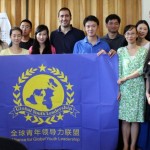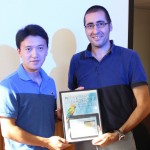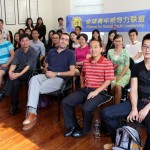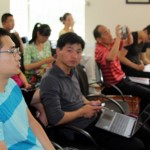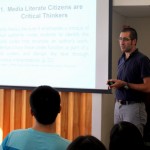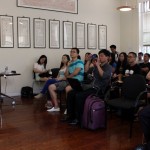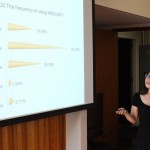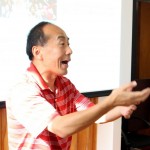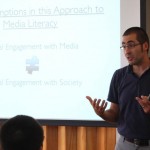By Xiaoqing Xing of GYLNAH and Zhang Tong of Beijing Normal University
Cambridge, Mass., September 2, 2014, Global Youth Leadership North American Hub(GYLNAH) held “Media Literacy and Youth Leadership” seminar at Harvard Yenching Library on August 27. The speaker, Paul Mihailidis, who is the President of Salzburg Academy on Media and Global Change, an Assistant Professor from Emerson College, gave a keynote speech of Media Literacy As Civic Currency. Gang Wu, a visiting scholar of Harvard University and Deputy Editor-in-Chief of Chinese National Radio Online made comments as guest speaker. The Seminar was host by Zhang Tong, the Minister of Publicity of Global Youth Leadership North America Hub, and also an Emerson College visiting scholar. About 40 students and visiting scholars from Harvard University, MIT, University of British Columbia, Canada, Tsinghua University, Peking University, Fudan University, Nankai University participated in the seminar.

Prof. Mihailidis delivers keynote speech(photo by Hao Wang).
- Keynote Speech
In his keynote speech, Prof. Mihailidis introduced the definition of Media Literacy and the relationship between media literacy and digital culture. He said “ Technology builds a bridge between media and the citizens in today’s digital media world. The emergence of social media breaks the traditional way of media communication: one-way broadcast from top to down, which greatly impact people’s lives. When the Internet and mobile Internet connect the independent individuals scattered all around the world, media literacy has become the latest issue of concern among the researchers around the world”.
Besides, Prof. Mihailidis pointed out “media literacy and public participation are inseparable. Media literacy plays a ‘prevailing currency’ role in the formation of civil society.” Every citizen use internet and social media to make his voices be heard, and to communicate with people around the world. Public act not only consumers but also producers in today’s new media environment. In a world internet plays vital important role, citizens with high media literacy is an effective creators and dissemination of useful information, however citizens with lower media literacy do not have the ability to rationally express themselves and can hardly actively participate in the social life. Furthermore, Prof. Mihailidis pointed out the potential features of “participatory culture”, such as: lower participation threshold, a strong support system of sharing, informal mentoring system, every participant can contribute his or her effort and so on. Prof. Mihailidis summarized, in today’s world, the term “literacy” has been extending from the traditional concept of “reading and writing ability ” to today’s “critical analysis of media texts” and “the proper use of the media to create content “. Media literacy is an essential ability for qualified citizens of the 21st century.
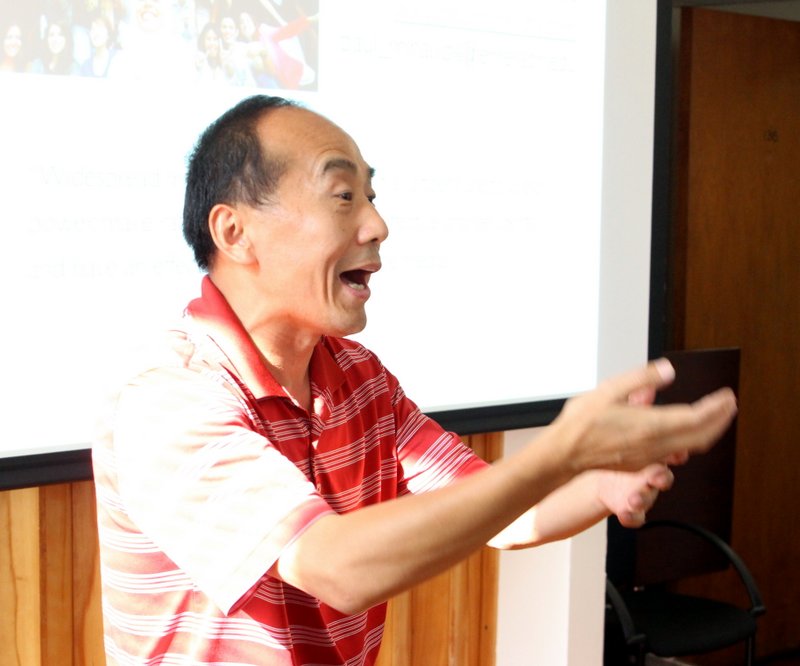
Mr. Wu Gang makes comments at the seminar(photo by Hao Wang).
- Guest Reviews
Subsequently, Wu Gang, the visiting scholar of Harvard University, Deputy Editor-in-Chief of Chinese National Radio gived wonderful comments. He highly praised the speech given by Prof. Mihailidis. He reviewed the”Broadcast President Roosevelt,” “TV President Kennedy,” “Internet President Obama” in different periods of American history, pointing out the importance of using media wisely. In today’s informational society, media literacy plays a huge role in fostering youth leadership. Young people should actively involved in media life, wisely use media for efficient communication, to enhance their personal leadership meanwhile”.
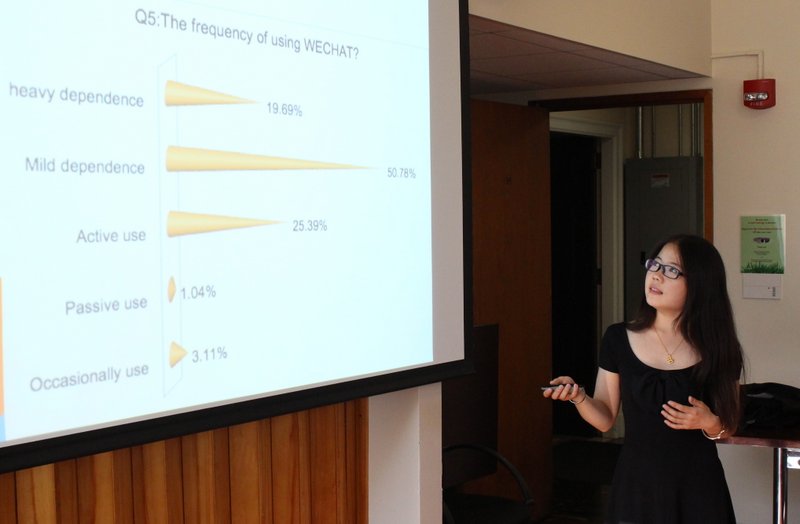
Zhang Tong reviews the survey data(photo by Hao Wang).
- Release of data
Tong Zhang, the Minister of Publicity of Global Youth Leadership North America Hub announced the latest survey “2014 Chinese Youth Wechat using habit” data findings. The questionnaire survey focused on youth between the ages of 18-30. In August 6, 2014 to August 25, the survey was given and collected from Chinese youth all over the world: China, USA, Canada, France and so on. From the 193 collected sample, there were 80 men and 113 women. The main conclusions are: First, the most commonly used three functions of Wechat are: circle of friends, sending text or voice communication, and group functions. Second, Chinese Young people’s dependence of Wechat are more than 70%, among them mild dependence accounted for 51% and severe dependence accounted for 20%. Third, the official account, family and friends are considered to be the most reliable sources of information. Fourth, when doubting about the authenticity of the information, only less than 50% of young people will gather information from other media to further verification. Fifth, fearing disclosure of personal privacy, hard to tell whether information is true or false, and too many groups result in spamming are currently Chinese youth’s three major problems when using Wechat.
- ExpertsSound
Guoping Zhang , a professor from Nankai University, commented : “Digital Media and social networks platform let everyone become media publisher. Media literacy education should not be limited to media major students, but to everybody. In this process, NGO should shoulder the responsibility to push media literacy education forward in cooperation with relevant institute. ”
Xiaohong Zhang, a professor from Fudan University, believed that internet is not only a personal space for opinion expressions, but also a public sphere. In this public sphere, to use media properly in civic life participation is a crucial issue need to cope with.
Yong Zhang, a young teacher from Xi’an Jiaotong University, hopes media literacy education can be implemented in Chinese school system, to help children adapt to this information society from an early age.
- Audience Feedback
In the Q/A session, audience put forward many constructive questions and had a lively discussion with Prof. Mihailidis. Peking University doctoral Gong said: “Today’s seminar is very enlightening. Media literacy education is very important and necessary to Chinese students who grew up in exam-oriented educational system. ” Zhuyi Rong , Northeastern University graduate students, thought “5A” model of media literacy was extremely impressive and he hoped to have the opportunity to practice these models.
After the seminar, audience continued communicating with Prof. Mihailidis . Yi Lu, the Vice President of Global Youth Leadership North America Hub presented Prof. Mihailidis a poster of this seminar as a gift.
Finally, the guests and the audiences stood in front of the banner of the Global Youth Leadership Alliance to take group pictures.
Even though audiences of this seminar came from different countries and regions, different schools and majors, they all reached a consensus on the importance and urgency of media literacy. The “media literacy and youth leadership” is the fourth speech of Youth leadership Forum hosted by Global Youth Leadership North America Hub, and it is also a new attempt of cooperating between media literacy education and NGO. It is designed to appeal to more young people to concern about media literacy and explore the new model of the cooperation between social media literacy education and NGO.
